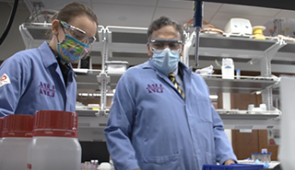- Oil spills, phosphate pollution and microplastic buildup have become major problems in environmental remediation
- Researchers call the ordinary looking sponge a pollution “Swiss Army knife” for its ability to address multiple pollutants
- Sponge collects materials for reuse and can be used repeatedly
EVANSTON, Ill. --- With a sponge that looks like one you might find in your kitchen, Northwestern University researchers have discovered how to effectively clean up oil, microplastics and phosphate pollution.
This sponge could help clean up oil spills without harming marine life and prevent algae blooms from forming when phosphate builds up to dangerous levels. To recover and reuse dwindling natural resources — like oil and phosphate — the sponge can simply be wrung out.
Northwestern engineer Vinayak Dravid, who developed the new tool, said the novel technology can accommodate multiple functions, much like a Swiss Army knife.
Dravid is the Abraham Harris Professor of Materials Science and Engineering at Northwestern’s McCormick School of Engineering and the founding director of the Northwestern University Atomic and Nanoscale Characterization Experimental Center (NUANCE). The sponge absorbs 99% of phosphate ions it encounters and 30 times its weight in oil.
Dravid is available to speak on impacts of oil spills and forms of “silent pollution,” scaling environmental efforts and his sponge-based platform.
“Unlike the smokestacks of yesteryears where you can see and feel the pollution in the air, a lot of this pollution is silent,” Dravid said. “This water pollution comes in all kinds, so we want to create a scalable technology which can address remediation.
“Almost half a billion tons of sponges are wasted each year and go to landfills. All we do is coat a tiny amount of nanotechnology slurry and that makes the sponge much more effective in capturing the pollutants. So, what we’re doing is using waste to clean waste.”
Vikas Nandwana, a research assistant professor of materials science and engineering at McCormick and co-founder of MFNS Tech, a startup in the process of commercializing oil-absorbing sponges, also is available to discuss the business side of environmental remediation and future uses of Northwestern’s sponge.
“We have already successfully tested our oil sponge in real-world conditions at a test tank within the National Oil Spill Response Research & Renewable Test Facility, which provides independent and objective performance testing of full-scale oil spill solutions,” Nandwana said.
“This is just the beginning. Different types of nanotechnology coatings can be made that capture a variety of pollutants not only from water, but also from air and soil. Our sponge surely has potential to revolutionize environmental remediation.”
Editor’s note: Dravid, Nandwana and Northwestern have financial interests (equities, royalties) in MFNS Tech, which is commercializing the technology.

